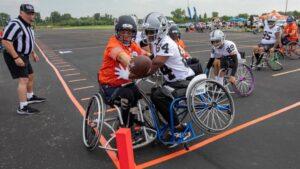
Photo Credit: Sports Travel
The USA Wheelchair Football League recently brought six teams from across the country to WestWorld of Scottsdale for what has become an annual showcase of athletic excellence. For those unfamiliar with the sport, this isn’t your typical feel-good story about overcoming obstacles – it’s about elite athletes competing at the highest level of their game.
The USA Wheelchair Football League is “the first of its kind football league for adults with disabilities to reach their highest potential through a competitive, fast-paced, team sport.” What makes this league remarkable isn’t the wheelchairs – it’s the caliber of competition. These athletes undergo rigorous training, follow complex playbooks, and execute strategies that would challenge any football player.
“We have 9 teams here from across the country and they’re here showing that people with disabilities can do anything,” explains Karalyn Stott with Move United, the organization behind the league. But that simple statement undersells what spectators actually witness: bone-crushing tackles, lightning-fast plays, and the kind of competitive fire that defines professional sports.
The 2025 tournament in Scottsdale represents something significant about accessibility in America today. We’ve moved far beyond ramps and designated parking spaces – though those remain essential – to creating environments where elite competition thrives. The athletes in this league aren’t seeking sympathy or inspiration points; they’re seeking championships.
What’s particularly striking about wheelchair football is how it forces viewers to recalibrate their understanding of athletic ability. The speed, strategy, and physicality on display challenge preconceived notions about disability sports. The league “brings together highly trained coaches with passionate athletes, building skills and inspiring athletes to excel both on and off the field through teamwork, dedication, and resilience.”
This isn’t about pity or inspiration porn – it’s about recognition. These athletes have dedicated countless hours to mastering their craft, just like their counterparts in the NFL or college football. The difference is the equipment, not the commitment or skill level.
As accessibility continues evolving in 2025, events like the Scottsdale tournament demonstrate that true inclusion means creating spaces where excellence can flourish, regardless of physical circumstances. When wheelchair football takes the field, what emerges isn’t a heartwarming story – it’s genuine, high-level competition that stands on its own merits.

